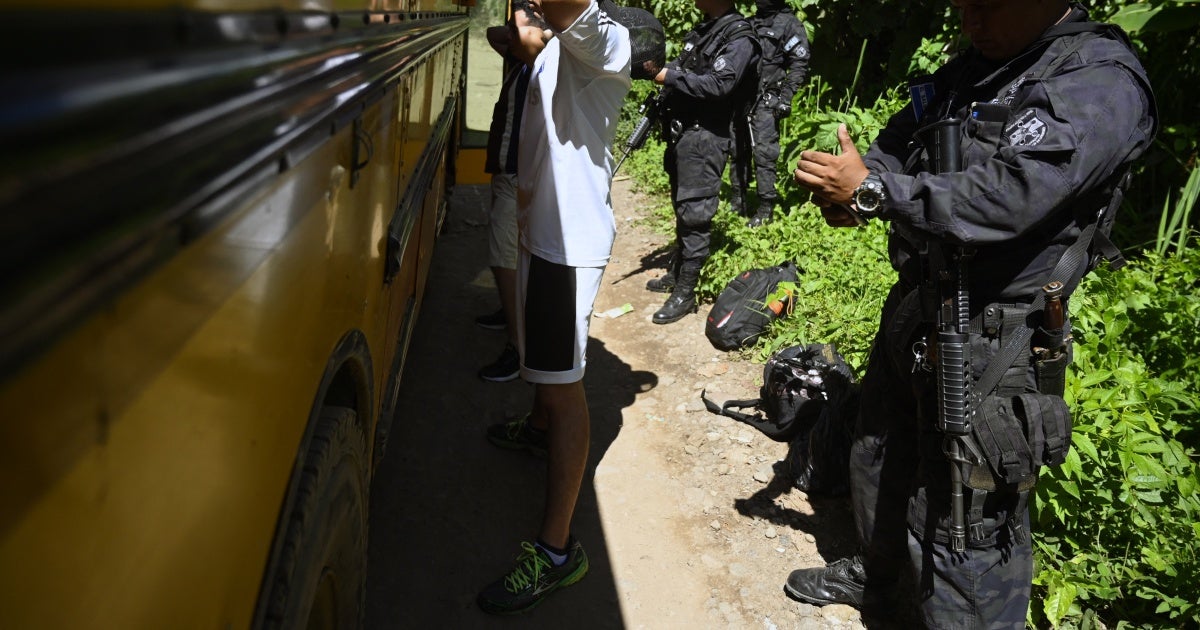
El Salvador Police Officers Expose Abuses
Interviews with police officers and internal police documents reveal abusive practices that have led to arbitrary detention and abuse of power in El Salvador, Human Rights Watch said today.
Police officers told Human Rights Watch that many arrests during the ongoing “war against gangs” were the result of pressure on police officers to meet daily arrest quotas and were based on dubious or fabricated evidence. They described arrests based on the fact that someone had a tattoo of any kind, on patently false information included in police reports, and on uncorroborated anonymous calls. The officers also described a climate of impunity that led some officers to demand bribes and, in some cases, demand sex from women in exchange for not arresting their relatives.
“President Nayib Bukele publicizes his security policies as a positive model for the world, but the police officers we spoke with tell a completely different story,” said Juanita Goebertus, Americas director at Human Rights Watch. “Their accounts provide a rare insight into how the Salvadoran police have fabricated evidence to fulfill arrests quotas, extorted innocent people, bypassed due process, and defied court orders.”
Since March 2022, El Salvador has been under a state of emergency, which suspended some due process rights. Security forces have since reported arresting over 86,000 people, including more than 3,000 children.
Human Rights Watch interviewed 11 police officers, with between 9 and 31 years of service. Nine are active members of the police. The two others have extensive knowledge about police and remain well connected with colleagues currently in the force. They included sergeants, investigators, forensic technicians, and agents in the states of Santa Ana, San Vicente, and San Salvador. Four of the interviews were conducted in San Salvador, and the rest by phone. Human Rights Watch has withheld the officers’ names and other identifying information due to security concerns. Human Rights Watch corroborated the police officers’ allegations with internal police documents, court rulings, and testimony from other police officers and victims of abuse.
Human Rights Watch has documented widespread human rights violations during the state of emergency including arbitrary detention, torture and other ill-treatment, and serious due process violations. The vast majority of detainees are held in pretrial detention, many in inhumane conditions.
While officers spoke of the serious security issues posed by gangs and said gang violence has decreased significantly, they denounced the tactics they said police were forced to adopt by their superiors. Officers said that they were often punished if they failed to meet daily arrest quotas. Some said they could not go off duty, have a meal, or rest at the station until they had met their quota. When officers refused or raised concerns about lack of evidence to justify an arrest, they were threatened with undesirable transfers or with being charged with the crime of “breach of duty.”
In some cases, they said, police files were fabricated. An officer said: “There are no investigations. Police just create profiles. These are arbitrary acts … that profile becomes the ‘evidence’ that someone is a gang member.”
Another officer said: “[People] would just call and say someone was a ‘collaborator,’ and we would go arrest them.” He described the practice as “detain first, investigate later.”
Many officers said that accusations received via anonymous calls that led to arrests at times proved to be false and based solely on personal disputes. As one officer put it, “People were detained just because a neighbor didn’t like them.”
Some officers also said that they had instructions not to allow detained people to be released. They described a “protocol” to create a new case against anyone courts ordered released to rearrest them immediately, in some cases, as one officer described it, “just as they passed the prison gates.”
Officers also said that the state of emergency and lack of accountability create an environment of impunity. As one of them described it, police felt “all-powerful.”
They also said that harsh working conditions, low salaries, and personal security risks, which have been long lasting problems in El Salvador, facilitate corruption and abuse of power.
Officers described how their colleagues extorted people and engaged in acts of sexual exploitation. “[The attitude of officers is] ‘if you don’t do what I say, I’ll apply the state of emergency to you,'” one said. “The state of emergency became a tool of coercion.”
“Gang violence has clearly decreased in El Salvador,” Goebertus said. “But Salvadorans are not safe: they are exposed to abuses by the country’s unchecked security forces. Experience suggests the abusive behavior will only worsen and spread if police are not held strictly accountable.”
Police Quotas and Other Perverse Incentives
Several police officers said that at times their superiors set a quota for the minimum number of arrests they needed to make each day and threatened to punish them if they did not meet it. They said such orders led to the arbitrary detention of people with no connections to gangs.
A police officer said:
Another police officer said:
A third one said:
Some police officers said they were threatened with transfers to other police stations or with serious sanctions if they failed to bring people in. “If we didn’t detain someone, they threatened us with charges of breach of duty [punishable by dismissal and incarceration]. In the end, we gave in out of fear,” one said.
Human Rights Watch also reviewed an April 2022 internal police report, in which three officers wrote to the inspector-general of public security, a police oversight body, describing sanctions against officers who refused to make an arrest due to lack of evidence. The report indicates that the officers had been ordered to detain the relative of a gang member and “not to return to base without conducting the arrest.” It also notes that the officers were required to make “a daily quota of five arrests.” The report also indicates that the officers refused to make an arrest because they believed there was no evidence linking the relative to crimes. The following day they were transferred to another police station.
These accounts are consistent with findings from the news outlet La Prensa Gráfica, which reported that officers were instructed to meet arrest quotas – a total of up to 1,000 per day nationwide – and faced threats of sanctions if they failed to comply.
Use of Dubious or Fabricated Evidence
Police officers said that the police made arrests on the basis of weak or false evidence. For example, they said, any visible tattoo was treated as grounds for detention.
Despite its inaccuracy, authorities have long relied on tattoos as an indicator of gang membership. Under the state of emergency, however, police said this practice has become even more entrenched. “Having a tattoo in El Salvador is now a crime,” one police officer said. “If the police see your tattoos, they won’t stop harassing you. If they don’t detain you, they stop and search you at any time, they take photos of you.”
The officer also said that police used tattoos as an excuse to accuse people of belonging to gangs, artificially increasing the number of alleged gang members arrested. He said that “police commanders wanted people detained for the crime of ‘unlawful association,'” which is typically used against gang members. “For example, if two people were fighting on the street, [prior to the state of emergency] we used to detain them for ‘public disorder.’ But under the state of emergency, if they have tattoos, they were also charged with ‘unlawful association’, even if they have nothing to do with gangs.”
A police sergeant said:
Several officers also said that many arrests, especially in the first months of the state of emergency, were made on the basis of uncorroborated anonymous calls to the police emergency 123 hotline. An officer said: “They would just call and say someone was a ‘collaborator,’ and we would go arrest them.”
Some said that the accusations made on anonymous calls were at times false and based solely on personal disputes. As one officer described it:
Several officers said that police reports (fichas policiales) used to justify arrests frequently relied on weak or fabricated evidence. They said that officials in the Information Analysis and Processing Section and the Police Intelligence Division created these reports based on unverified or false information.
These internal files, which are normally based on criminal records and intelligence reports, include names, ID numbers, addresses, photographs, alleged gang affiliations, aliases, and other information. They are kept in internal police databases and typically used by police officers to identify the people they arrest or stop at checkpoints.
Officers said that during the state of emergency having a prior police record, regardless of whether there was a pending arrest warrant or investigation, has been sufficient grounds for police to make an arrest.
For example, one officer said:
Another officer said:
A third officer described a “method” used to create the reports:
The investigative outlet El Faro found, after reviewing 690 criminal files, that many used imprecise descriptions such as “looking like a gang member,” “fitting a profile,” or “nervous appearance.”
In March 2024 officers detained the son of a police sergeant, accusing him of being a gang member. He was detained after soldiers intercepted him during a hike in Santa Ana and flagged his tattoos – which include his initials and a small lizard – as gang-related, even though he had no prior gang record.
In response to the arrest, a senior police officer issued a memo to the Department of Police Investigations, which Human Rights Watch reviewed, reminding police officers that police files should be based on “information previously confirmed through an investigation and/or existing in the corresponding files or control systems.” The son of the sergeant remains in detention.
Human Rights Watch reviewed several court rulings that sentenced children accused of gang membership solely on the basis of police files and testimony from police involved in the arrest. Typically, police officers cited police files and nothing else when testifying in court that a defendant is a member of a gang, and prosecutors did not put other witnesses on the stand or offer additional evidence. Even though police files and testimony are often the only “evidence” presented against defendants at trial, judges repeatedly gave them more weight than the testimony of defense witnesses or school or work records that defense lawyers offer to prove that the children accused were not gang members.
In one ruling, a judge acknowledged that the use of police files against children appeared to contradict article 30 of the Juvenile Criminal Law, which states in part: “[c]riminal records cannot be kept for offenses attributed to children.” However, the judge ruled that a police file does not constitute “a formal criminal record” and that the state of emergency had, in her view, “g[iven] legal effect to the police intelligence database arising from citizen reports.”
Human Rights Watch reviewed a 2024 Attorney General’s Office document instructing officials to compile photos in “photograph albums” of alleged members of two MS-13 “cliques,” or units. A police officer said that the “photograph albums,” which normally include photos of people and their tattoos, will most likely be used as evidence of gang membership in mass trials authorized under a July 2023 law.
Other Forms of Abuse of Power
Officers said the state of emergency gives them broad powers that many of their colleagues abuse. They said that the authorities foster an environment of impunity that allows officers to target anyone, regardless of whether there is evidence linking them to a crime. Some described it as a “blank check.”
One recalled a police officer telling a street vendor, “I have the power to decide whether I lock you up or not.” He said that the officer arrested the vendor because she did not respond to the officers’ order to move her food cart. “She ended up in jail. She was crying and told us it was her birthday,” the officer said. “I saw this with my own eyes.”
Police officers also said some of their colleagues received bribes to arrest people. One former police officer said:
Some officers also said that the police demanded bribes or engaged in sexual exploitation, soliciting sexual favors in exchange for preventing the detention of a relative. One said:
These allegations are consistent with findings by La Prensa Gráfica. In one case, officers reportedly told a woman that her brother, who has a mental disability, had been arrested to fulfill a detention quota and that she would need to engage in sexual acts with several officers to secure his release.
Rearrest of Detainees
Since the start of the state of emergency, Salvadoran authorities have detained over 86,000 people.
El Salvador has one of the highest rates of pretrial detention in Latin America and the Caribbean. According to a World Bank report from April 2025, only 23 percent of people in prison have been convicted and sentenced: the lowest proportion in Latin America.
According to government figures, over 8,000 people detained during the state of emergency have been released.
One reason that so many innocent people remain behind bars, an officer said, is that police have instructions to prevent the release of detainees. Two officers said that people released from prison during the state of emergency are often re-arrested immediately upon exiting the prison gates.
One of them said:
Another officer who managed a police station where people who had been arrested were held, said that officers were instructed not to comply with judicial orders to release people:
Several media outlets have documented cases of people being rearrested immediately after their release.
Police Working Conditions
Police officers said that harsh working conditions, low salaries, and personal security risks, which have been longstanding problems in El Salvador, facilitate corruption and abuse of power.
One said the police station where he works is overcrowded, with one bathroom for 50 people, water often running out, and toilets often unusable. During the first months of the state of emergency, some officers remained on duty for shift after shift without leave for up to two months.
According to official data from 2024, agents – who occupy the lowest rank within the National Civil Police (PNC) – earn between US$424 and US$603 per month, depending on their years of service. Agents make up the vast majority of the police force. Officers said that low salaries facilitate corruption. “You can’t live on that,” an officer with 28 years of service said. “That’s why some officers turn to corruption.”
Many officers also were traumatized by the nature of the work and threats from gang members. “They told me a hundred times they were going to kill me,” an officer said. “Being a police officer was harder than the war,” another one said.
https://www.hrw.org/news/2025/06/27/el-salvador-police-officers-speak-out-about-abuses


